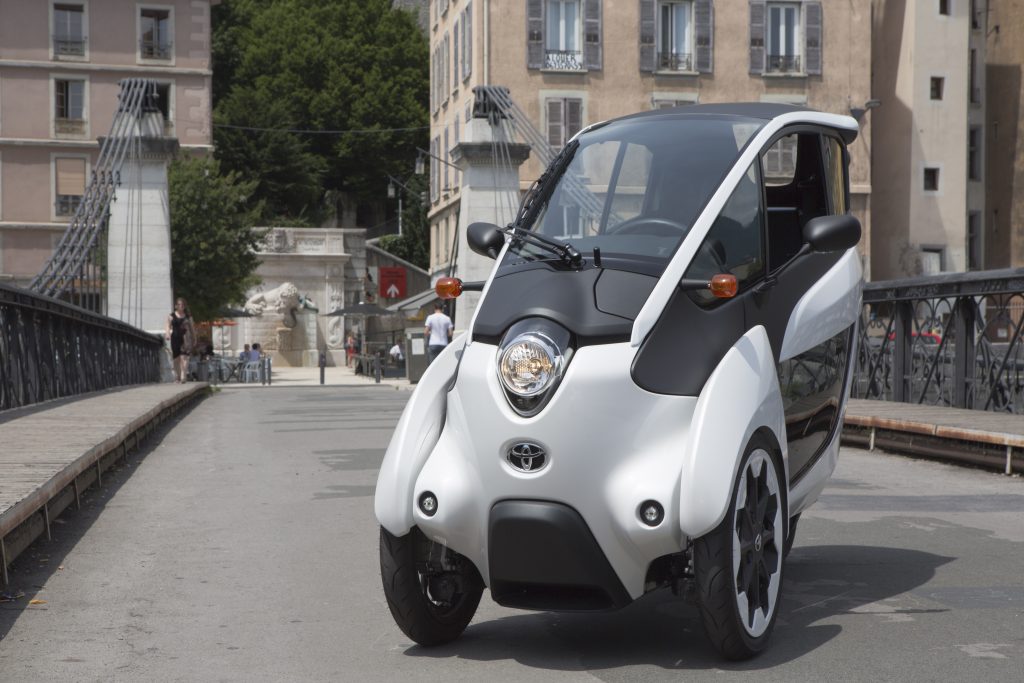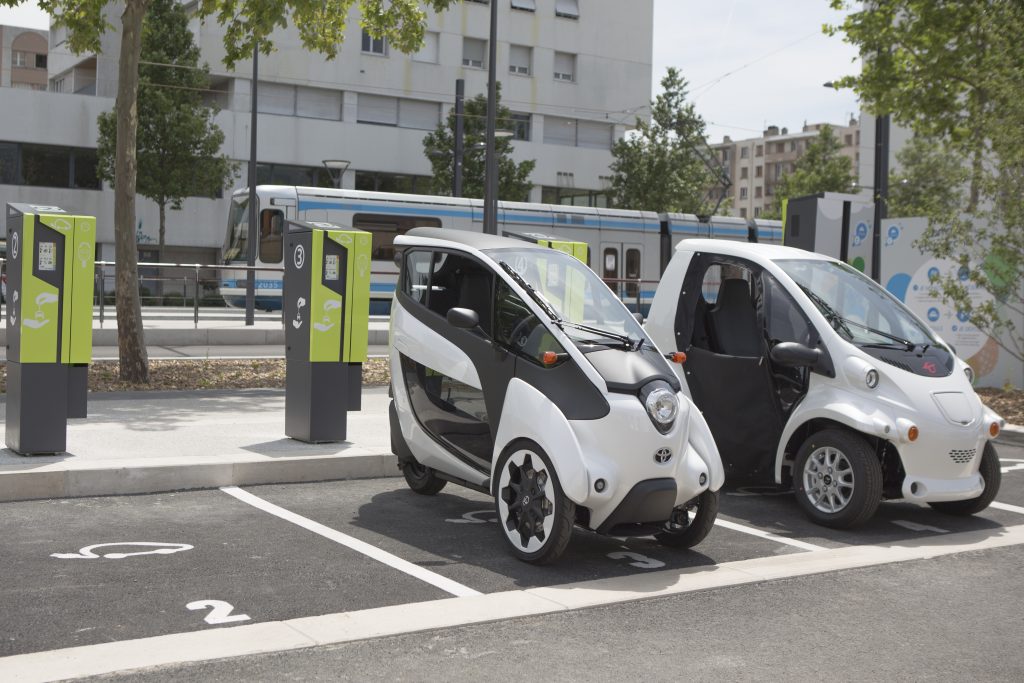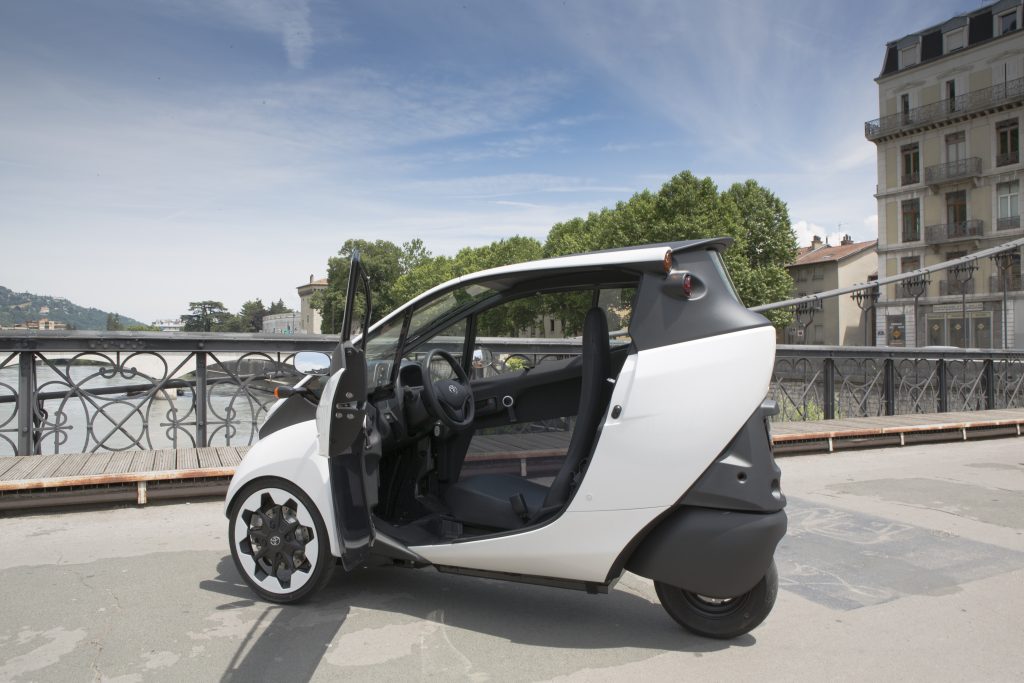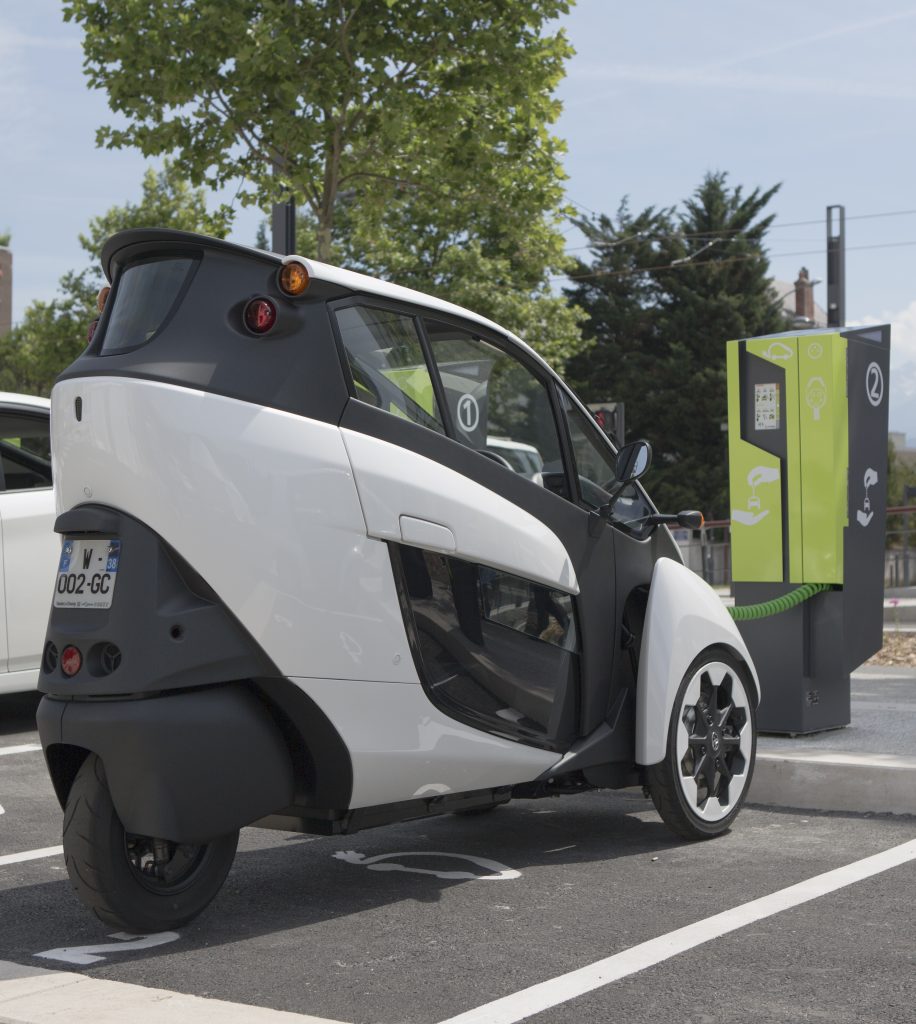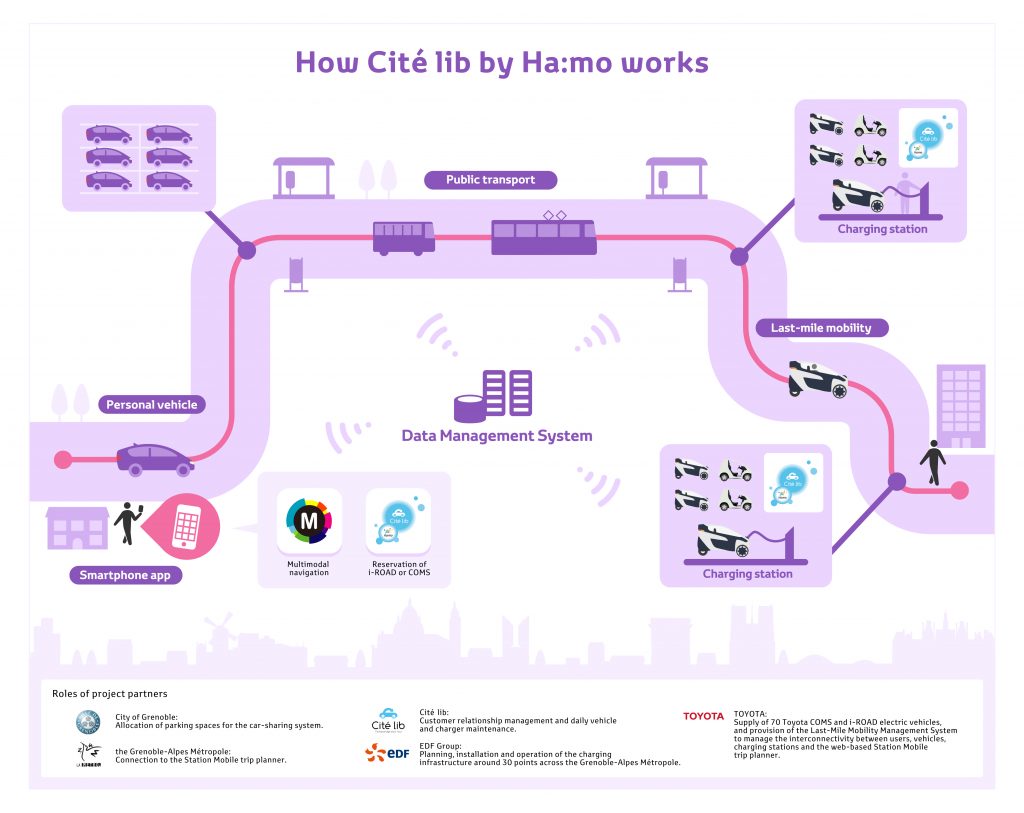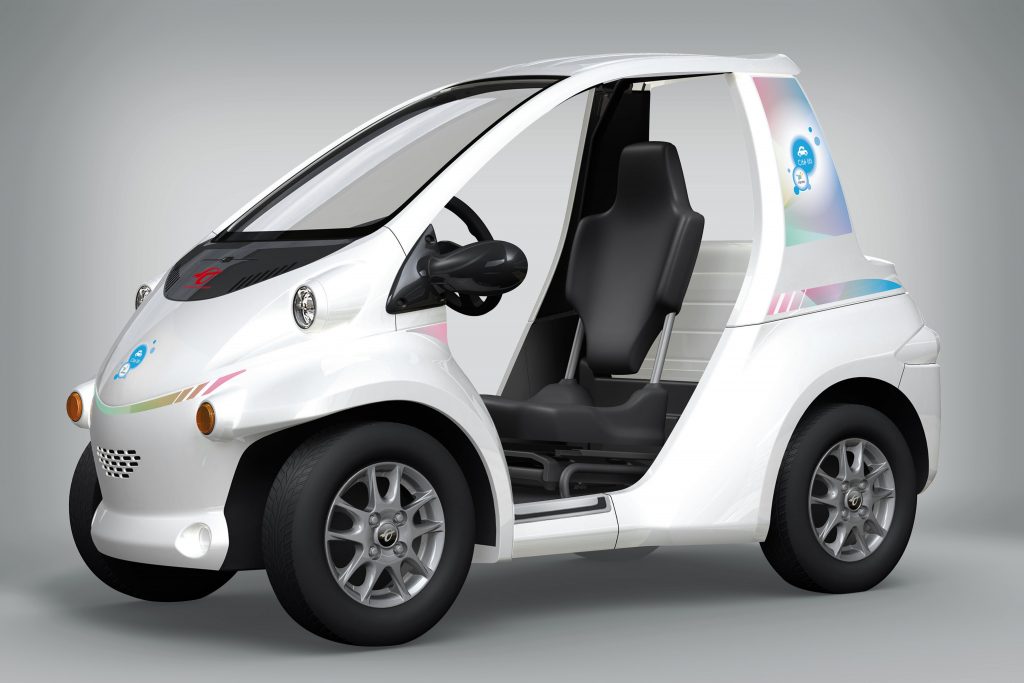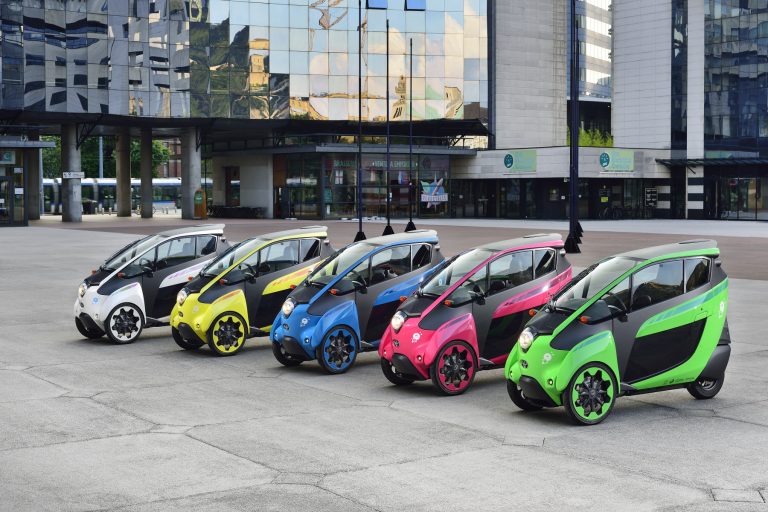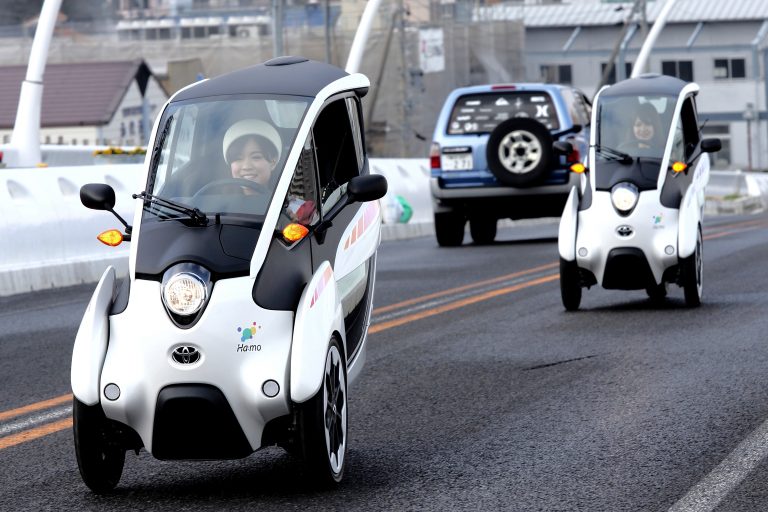Toyota Electric Vehicles Ready For “Smart City” Public Transport Scheme In Grenoble
Toyota is contributing 70 of its i-ROAD and COMS ultra-compact personal mobility electric vehicles to a three-year integrated EV car sharing and public transport test project that is being launched in Grenoble, France in the autumn. It will be i-ROAD’s first official on-road trial in Europe. Please find below the official press release from the partners in the Grenoble project; for more details about i-ROAD, please visit Toyota’s UK media website here.
Grenoble, “Smart City” from October with ‘Citélib by Ha:mo‘, an innovative 100% electric car-sharing scheme connected to public transport
- Urban transport of the future will become a reality in October in the French city of Grenoble thanks to a partnership between the City of Grenoble, Grenoble-Alpes Métropole, EDF Group, Toyota and Citélib
- 70 Toyota “i-ROAD“ and “COMS“ ultra-compact electric vehicles will be available in a car-sharing scheme, promoting interconnectivity between public and private electrified personal transport
- Vehicles can be charged at around 30 charging stations managed by Sodetrel (EDF Group) and located close to public transport stops
- Called “Citélib by Ha:Mo“, this innovative service is ready for pre-registration by Grenoble commuters on www.citelib.com and will be operational for a three-year real-life test
You hear a lot about future mobility, smart cities, and other innovations designed to make cities and urban transport more pleasant and manageable in years to come. Concrete examples, however, are still few and far between. When the back-to-school season begins after this summer, this dream will become a reality in Grenoble and the outlying area, making the French Alps city a pioneer in future mobility.
In October 2014, 70 Toyota i-ROAD and COMS ultra-compact electric vehicles, and around 30 charging stations developed and managed by EDF’s subsidiary Sodetrel, will be open for service for a period of three years thanks to a unique partnership between the City and the Metropolitan Area of Grenoble, French energy company EDF, Japanese car maker Toyota and Citélib, a local car-sharing operator.
Connected to the public transport system’s IT infrastructure, this new car-sharing scheme will complement Citélib, the current car-sharing service of Grenoble, by allowing users to pick up one of the small EVs at one location and drop it off at another. The project also aims to promote interconnectivity of public transport methods (trams, buses, trains) and a new type of personal mobility using small vehicles that don’t take up as much space as a normal car. The main idea is to allow commuters to drive the first or last kilometres of their journey for increased flexibility and time-saving, thus contributing to reducing traffic congestion and improving air quality in city centres.
Citélib by Ha:mo responds to today’s challenges… and saves you time
Recent social trends and consumer behaviours make it clear that sustainable mobility is here to stay. The only question is how fast this market will develop.
Surveys show that the average daily commute in Europe takes between 40 and 50 minutes. Increasingly, commuters use public transport, but most of them still have to walk a good 15 minutes to reach their final destination. New IT technologies, paired with innovative mobility solutions, are starting to allow the introduction of more flexibility to urban mobility, and will undoubtedly make up the cornerstone of future smart cities.
Just imagine: it’s Monday morning. You leave your apartment on the outskirts of Grenoble at 7:25 to go to work. Half asleep, you take the tram to the city centre—a 20-minute ride. You get off, and wait for the connecting bus for five minutes. Ten minutes later, the bus drops you off five minutes from your office. It’s 08:05. You’re late, again, for the 8:00 meeting and haven’t even had time for a coffee. Sometimes, for more flexibility, you take your car. You drive to the city but this means you must leave even earlier, at 7:15 – and that’s not a guarantee you’ll arrive on time, with traffic and the time it takes to find a parking spot. Sound familiar?
With Citélib by Ha:mo, say goodbye to stress and delays. During your tram ride, you whip out your smartphone. With an app, you can visualise the available i-ROADs at your usual stop. In a few clicks, you reserve and pay. Another app can also allow you to see the status of traffic and public transport before you leave, so you can plan the best route that day.
Once you get off the tram, all you have to do is flash your phone onto the charging station to release your i-ROAD. In six minutes, you ride to the charging station near your office, two minutes away. It’s 7:53 – plenty of time for a coffee before the 8:00 meeting. You just saved 30% of your commute time. Going somewhere else that morning? No problem. There are around 30 stations in Grenoble, a network tight enough to get you as close as possible to your destination.
A unique partnership with a common vision of tomorrow’s urban mobility
By bringing together their respective competencies, the project partners are offering Grenoble an innovative service which will allow a real-life, thorough evaluation of the potential of this new form of mobility. “The Grenoble-Alpes Métropole community has always been open to innovation,” explains Christophe Ferrari, President of the Grenoble-Alpes Métropole. “In terms of scale, it’s perfectly suited to this kind of test, and in Grenoble, we have a tradition of daring to do things. The partnership itself, between us, Toyota, EDF and Citélib, a local car-sharing operator, is in and of itself also an innovation in France,” he added. “It’s a great opportunity for our community to test, for three years and exclusively in Europe, a new mode of mobility that’s not only innovative but also economic and ecological It’s an experimentation that is bound to be followed by others for the benefit of our citizens.”
The scale of this integrated and complex project means it’s impossible to realise alone: partnerships and collaboration are key to its success – between the project partners of course, but also with the local communities.
- EDF is bringing around 30 charging stations to the project, but also more than a half-century of experience in developing electric mobility, both through battery technology and managing charging infrastructures. EDF aims to accompany its public, corporate and private customers in transitioning towards modes of transport that are more sustainable, less noisy and CO2-emission free. “To become the city of tomorrow, Grenoble must be both attractive economically, and a nice place to live. Electric mobility offers a good measure of both, by allowing different types of transport to complement one another. It brings together traditional types of transport with innovative ones such as this type of last-mile mobility brought about with this project,” says Christian Missirian, Director of EDF Commerce Rhone-Alpes Auvergne.
- Sodetrel, a fully-owned subsidiary of EDF, brings its considerable expertise to the project: this includes management of charging infrastructure for EVs and PHEVs, commercial management of charging services, and car-sharing service management for the public and private sectors.
- Toyota is providing the 70 ultra-compact electric vehicles used in the project: the Toyota COMS (single-seater, four wheels, a small rear storage compartment) and the Toyota i-ROAD (two-seater, three wheels with Active Lean technology). The latter introduces a completely new and fun way to drive. Very compact, it combines the exceptional handling of a motorcycle or a scooter with the comfort and stability of a car. Four i-ROAD occupy the footprint of a single car.
Toyota is also developing a data management system that will enable the visualisation and reservation of the vehicles. The system will integrate with Grenoble’s existing transport IT system to offer route planning with different modes of transport from a smartphone. Citélib by Ha:mo is Toyota’s second “Ha:mo” (short for Harmonious Mobility) project and the first outside Japan. “This concept fits within our overall future mobility vision which is based on four pillars: safety, comfort, ease of use and ecology,” commented Michel Gardel, Vice President of Toyota Motor Europe. “Ha:mo was designed to reduce the stress caused by traffic jams, peak traffic hours, and searching for a parking space. It also allows a reduction in emissions that cause poor air quality in city centres,” he added.
- Citélib was chosen for its track record, with more than 10 years of experience in running car-sharing programs in the region. “On top of our current vehicle range, from two to nine occupants, Citélib by Ha:mo will fill an important gap for short-distance travel and allow our customers to pick up and drop off their vehicles at different locations,” explains Martin Lesage, General Director of Citélib. “We have seen 30% annual growth of car sharing in Grenoble, and our service attracts 50% private and 50% corporate customers. It supports the development of economic activity in various areas of the metropolitan area, and links university campuses and research centres,” he said.
Why Grenoble?
Grenoble has long been an innovative city. Its famous “Presqu’île” science park is home to prestigious institutions and companies, such as the CEA and ST Microelectronics. Its slogan is: “Where we imagine the city of tomorrow”. Its university has more than 60,000 students on one of the most modern campuses in France. In 1987, Grenoble was the second French city after Nantes to re-introduce electric trams. In 2013, 78 million people used the local public transport network. Today, the fifth line of the tram network is beginning operation. Other ecological modes of transport have also an important place in the city’s transport system, such as 5,000 “Metrovélo” bicycles and more than 320 km of bicycle lanes.
Grenoble citizens can reserve now
Grenoble metro community citizens can already pre-register for Citélib by Ha:mo. If they register as early as this summer, they will receive time credits towards future usage of the service when it becomes operational in October.
For more images and information on the i-ROAD click here

